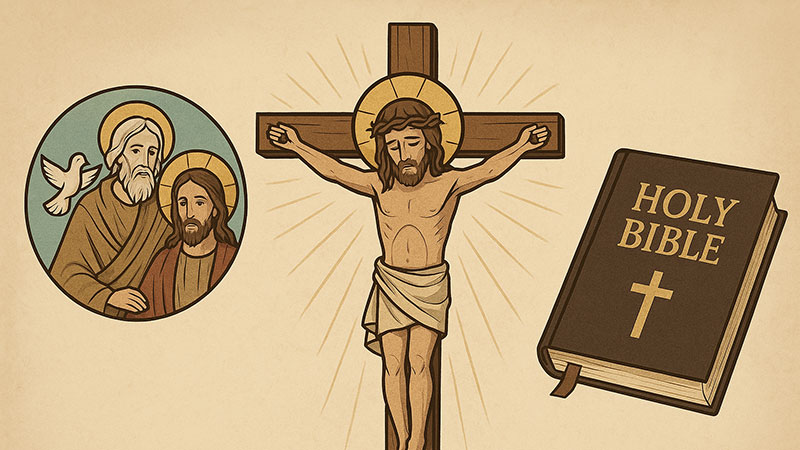Christianity, with its rich history and global reach, encompasses a vast array of denominations and traditions. Yet, beneath this diverse tapestry lies a unifying foundation of Core Christian Beliefs that bind believers across all churches. Understanding these fundamental truths is crucial for anyone seeking to grasp the essence of the Christian faith.
Before delving into these profound topics, take a moment to pray and seek guidance from the Lord. As Christians, we are called to surrender our lives to Jesus Christ, acknowledging Him as our only hope and the path to eternal life. It’s through Him, our living God, that all these truths find their meaning.
Read More: What Is The Nicene Creed? Learn Here
The Unifying Pillars of Faith: Core Christian Beliefs
Despite differences in worship styles, governance, or even minor theological interpretations, three fundamental beliefs stand as the bedrock for virtually all Christian churches. These aren’t peripheral doctrines but central truths that define what it means to be a follower of Christ.
1. The Trinity: One God in Three Persons
One of the most distinctive and profound Core Christian Beliefs is the doctrine of the Trinity. This teaches that there is one God, eternally existing in three distinct persons: God the Father, God the Son (Jesus Christ), and God the Holy Spirit. This isn’t three gods, but one God revealed in three co-equal, co-eternal persons.
God, the Father
The Creator and Sustainer of the universe. He is the ultimate source of all things, who lovingly initiates salvation. As Malachi 2:10 (ESV) asks, “Have we not all one Father? Has not one God created us?”
God, the Son (Jesus Christ)
The incarnate Word of God, fully God and fully man. He came to earth to reveal God’s character, live a sinless life, die for our sins, and rise again, conquering death. John 1:1, 14 (ESV) states, “In the beginning was the Word, and the Word was with God, and the Word was God… And the Word became flesh and dwelt among us.” Our Lord Jesus Christ is the unique bridge between God and humanity.
God, the Holy Spirit
The third person of the Trinity, who indwells believers, empowers them for service, guides them into truth, and convicts the world of sin and righteousness. John 14:26 (ESV) promises, “But the Helper, the Holy Spirit, whom the Father will send in my name, he will teach you all things and bring to your remembrance all that I have said to you.”
While a mystery that human minds cannot fully comprehend, the Trinity is presented in Scripture. For instance, at Jesus’ baptism, all three persons are present: the Father’s voice from heaven, the Son being baptized, and the Spirit descending like a dove (Matthew 3:16-17). This unified yet distinct nature of God forms the very foundation of the Christian understanding of the Divine.
Read More: Christian Denominations: Which Is Right for You?
2. The Divinity of Jesus Christ and His Atoning Work: Our Only Salvation
Another indispensable Core Christian Belief is the full deity of Jesus Christ and the redemptive power of His death and resurrection. Without this, Christianity loses its saving power.
- Jesus is God Incarnate: Christians believe Jesus is not merely a good man, a prophet, or a religious teacher, but God made flesh. This is crucial because only a perfect, divine sacrifice could atone for the sins of humanity. Colossians 2:9 (ESV) affirms, “For in him the whole fullness of deity dwells bodily.”
- His Atoning Death and Resurrection: The central event of human history, from a Christian perspective, is Jesus’ death on the cross and His subsequent resurrection. His death was a substitutionary atonement. He took upon Himself the penalty for our sins, which we justly deserved. Romans 5:8 (ESV) declares, “But God shows his love for us in that while we were still sinners, Christ died for us.” His resurrection, three days later, validated His claims to be God, demonstrated His victory over sin and death, and guaranteed eternal life for all who believed. 1 Corinthians 15:3-4 (ESV) summarizes, “For I delivered to you as of first importance what I also received: that Christ died for our sins by the Scriptures, that he was buried, that he was raised on the third day by the Scriptures.” It is through Jesus Christ, and Him alone, that we find reconciliation with God and salvation. He is our living God and the single path to redemption.

3. The Authority and Inerrancy of the Bible: God’s Inspired Word
The third essential Core Christian Belief revolves around the nature of the Bible. Christians universally affirm that the Bible is the inspired Word of God, authoritative and without error in its original writings. It is the primary means by which God reveals Himself to humanity and guides individuals in their lives and faith.
- God-Breathed and Profitable: The Bible is not merely a collection of human writings, but “God-breathed” (2 Timothy 3:16, ESV). This means God superintended the human authors, ensuring that what they wrote was His perfect truth. Because of its divine origin, it is “useful for teaching, rebuking, correcting and training in righteousness, so that the servant of God may be thoroughly equipped for every good work.”
- Our Guide for Life and Doctrine: The Bible serves as the ultimate rule for faith and practice. It teaches us about God’s character, His plan for salvation, His commands, and His promises. Psalm 119:105 (ESV) eloquently states, “Your word is a lamp to my feet and a light to my path.” For any believer interested in Core Christian Beliefs, consistently engaging with the Bible is indispensable.
Embracing Our Living God: Prayer and Surrender to Jesus Christ
Understanding these foundational Core Christian Beliefs is more than just intellectual assent; it’s an invitation to a transformed life. Before you deepen your understanding of these truths or embark on any spiritual journey, remember the power of prayer.
Psalm 50:15 (ESV) tells us, “Call upon me in the day of trouble; I will deliver you, and you shall glorify me.” Seek God’s wisdom and guidance, knowing He desires to reveal Himself to you.
Ultimately, the goal of understanding these beliefs is not just knowledge, but a personal relationship with our Lord Jesus Christ. He is our living God, who offers forgiveness, hope, and eternal life to all who believe.
The call for every Christian is to surrender our lives to Jesus Christ, to turn from sin, trust in His completed work on the cross, and follow Him as Lord. This means acknowledging Him as the single way, truth, and life, as John 14:6 (ESV) powerfully states: “Jesus answered, ‘I am the way and the truth and the life. No one comes to the Father except through me.”
Read More: Why You Should Join a Church: A Biblical Journey
Conclusion: Unity in Essential Truths
While the Christian landscape is vast and varied, the 3 Core Shared Beliefs discussed, the Trinity, the divinity and atoning work of Jesus Christ, and the authority of the Bible, provide a unifying thread that runs through all authentic Christian churches. They are not merely theological concepts but living truths that shape our understanding of God, salvation, and our purpose.
As you continue your journey of faith, anchor yourself in these unchanging truths, rooted in God’s Word. Always remember to pray, allowing the Holy Spirit to guide you, and continually surrender your life to Jesus Christ, for in Him alone we find true life and the abundant joy of knowing our living God. Amin.
FAQ
Yes. Christian faith is based on a relationship with God, not a complete understanding of Him. Just as we can’t fully grasp the universe with our minds, we can’t fully comprehend all of God’s mysteries. You can believe what the Bible teaches about the Trinity and gain a deeper understanding over time through studying God’s Word and prayer.
No, the Bible contains various literary genres, including history, poetry, narrative, and apocalyptic writing. Christians believe the entire Bible is God’s inspired Word, but it must be studied in its historical and literary context. Therefore, proper interpretation means considering the original author’s intent and the genre of the text.
The Bible teaches that we are all separated from God because of sin. Only a perfect, sinless sacrifice could pay the price for that sin and bridge the gap between humanity and God. Jesus, who was fully God and fully human, provided that perfect sacrifice. His resurrection proved that He has the power to overcome sin and death, giving us hope for eternal life.









Add comment